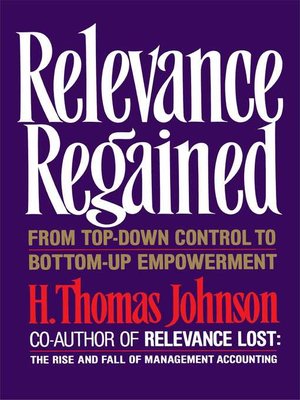
Sign up to save your library
With an OverDrive account, you can save your favorite libraries for at-a-glance information about availability. Find out more about OverDrive accounts.
Find this title in Libby, the library reading app by OverDrive.



Search for a digital library with this title
Title found at these libraries:
| Library Name | Distance |
|---|---|
| Loading... |
Building on his pathbreaking, award-winning bestseller, Relevance Lost, H. Thomas Johnson presents a devastating critique of the top-down hierarchical accounting systems that have dominated American corporations since the 1950s.
In Relevance Regained, Johnson shows exactly how "managing by remote control" through results-oriented accounting information has obstructed the real business objective: to reduce process variation and lead times for the purpose of obtaining and keeping satisfied customers. The failure of most American businesses to be competitive and profitable, he contends, is their reliance on management accounting information to control people's actions and productivity.
Cost-focused imperatives from on high must be replaced, Johnson asserts, with information systems that link actions with imperatives of global competition. Self-managing work teams, according to Johnson, must own problem-solving information to reduce variation, delays, and excess in processes.
Johnson prescribes the necessary changes in management principles that must replace the outdated style associated with the industrial revolution. Responsiveness to customers—not accounting costs—and flexibility—reducing lead times and removing constraints—are necessary for sustained competitive excellence and long-term profitability.
Johnson discusses the radical overhauls of companies, such as General Electric's work-outs/"best practices" program and Harley-Davidson's work simplification programs, and shows how these strong commitments to new strategies maximize a company's most important assets: people and time. To be globally competitive, he claims, a company's work must be directed toward selling to customers, not just selling products.
In Relevance Regained, Johnson shows exactly how "managing by remote control" through results-oriented accounting information has obstructed the real business objective: to reduce process variation and lead times for the purpose of obtaining and keeping satisfied customers. The failure of most American businesses to be competitive and profitable, he contends, is their reliance on management accounting information to control people's actions and productivity.
Cost-focused imperatives from on high must be replaced, Johnson asserts, with information systems that link actions with imperatives of global competition. Self-managing work teams, according to Johnson, must own problem-solving information to reduce variation, delays, and excess in processes.
Johnson prescribes the necessary changes in management principles that must replace the outdated style associated with the industrial revolution. Responsiveness to customers—not accounting costs—and flexibility—reducing lead times and removing constraints—are necessary for sustained competitive excellence and long-term profitability.
Johnson discusses the radical overhauls of companies, such as General Electric's work-outs/"best practices" program and Harley-Davidson's work simplification programs, and shows how these strong commitments to new strategies maximize a company's most important assets: people and time. To be globally competitive, he claims, a company's work must be directed toward selling to customers, not just selling products.







